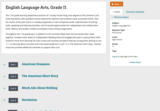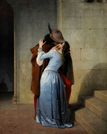
A scanned copy of the 1872 publication of The Pioneers by Robert Michael Ballantyne, a nonfiction book for children.
- Subject:
- Arts
- English Language Arts
- Material Type:
- Primary Source
- Provider:
- University of Florida
- Date Added:
- 12/01/2023

A scanned copy of the 1872 publication of The Pioneers by Robert Michael Ballantyne, a nonfiction book for children.

An article on Bessie Head which gives biographical information as well as a good discussion on her writing.

Online lesson which allows students to choose a person of interest and create a timeline of their life. Includes working together, researching potential conflicting information, and developing essays from the original research. [Requires Adobe Flash Player.]

Explore how Dickens's skill in creating memorable secondary characters help make his works not only memorable, but has kept them popular for more than 160 years in this video excerpt from the Masterpiece adaptation of Charles Dickens' David Copperfield. Wilkins Micawber does more than provide comic relief. He is a kindly father figure to David and offers an important respite for David on his way to adulthood. [2:06]

Analyze the filmmakers' choices when adapting a Dickens novel into a film. In this pivotal scene from the 2000 Masterpiece production of "David Copperfield," David, destitute and desperate, approaches his formidable Aunt Betsey for the first time. The director and screenwriter had to make tough choices about what to keep and what to change or delete. As students analyze the scene by comparing Dickens's original text with the film adaption, they explore the challenges that confront filmmakers when interpreting a literary work for the screen. [2:05]

The Digital Library provides links to the complete texts of 14 of Anthony Trollope's works in many different formats.

Read the complete text from the book "Up from Slavery: An Autobiography", by Booker T. Washington, in which he explores his journey from slave to educator. Includes illustrations, biographical facts, and links to further information on his life.

E-text of a book with primary and secondary source information about Harriet Tubman by Sarah Bradford published in 1886. RI.9-10.7 different mediums

HTML full text of the "Life and Times of Frederick Douglass," the autobiography of the 19th century African American abolitionist (1818-1895).

Study about the leader of Athens during its golden age of Ancient Greece named Pericles on this site.

Discussing real life heroes and heroines and viewing their pictures will help students learn about reading and writing biographies. A writing rubric assessment is included in this series of activities designed to teach about heroes and comparing and contrasting.

Environmental Education for Kids! provides a very informative and thorough biography of Aldo Leopold, the "father" of wildlife mangagement.

This Queen Elizabeth I of England site features many resources, both text and illustrations, about the life and times of the Tudor monarch who lived from 1533-1603.

Examine how Emma's surprising views on marriage reflect the limited opportunities for women in Regency England, in this excerpt from the 2009 Masterpiece adaptation of Jane Austen's Emma. In this scene, Harriet is shocked to hear Emma proclaim, "...I have very little intention of marrying at all." For a woman in Regency England this is an almost radical proclamation. This resource is part of the Masterpiece Collection. [1:05]

The 11th grade learning experience consists of 7 mostly month-long units aligned to the Common Core State Standards, with available course material for teachers and students easily accessible online. Over the course of the year there is a steady progression in text complexity levels, sophistication of writing tasks, speaking and listening activities, and increased opportunities for independent and collaborative work. Rubrics and student models accompany many writing assignments.Throughout the 11th grade year, in addition to the Common Read texts that the whole class reads together, students each select an Independent Reading book and engage with peers in group Book Talks. Students move from learning the class rituals and routines and genre features of argument writing in Unit 11.1 to learning about narrative and informational genres in Unit 11.2: The American Short Story. Teacher resources provide additional materials to support each unit.

This unit uses William Shakespeare’s Much Ado About Nothing as a vehicle to help students consider how a person is powerless in the face of rumor and how reputations can alter lives, both for good and for ill. They will consider comedy and what makes us laugh. They will see how the standards of beauty and societal views toward women have changed since the Elizabethan Age and reflect on reasons for those changes. As students consider the play, they will write on the passages that inspire and plague them and on topics relating to one of the themes in the play. Finally, they will bring Shakespeare’s words to life in individual performances and in group scene presentations.
ACCOMPLISHMENTS
Students read Shakespeare’s Much Ado About Nothing .
Students read two Shakespearean sonnets and excerpts from an Elizabethan morality handbook dealing with types of women, and they respond to them from several different perspectives.
For each work of literature, students do some writing. They learn to write a sonnet; create a Prompt Book; complete a Dialectical Journal; and write an analytical essay about a topic relating to a theme in the play.
Students see Shakespeare’s play as it was intended to be seen: in a performance. They memorize 15 or more lines from the play and perform them for the class. Students take part in a short scene as either a director or an actor.
GUIDING QUESTIONS
These questions are a guide to stimulate thinking, discussion, and writing on the themes and ideas in the unit. For complete and thoughtful answers and for meaningful discussions, students must use evidence based on careful reading of the texts.
What are society’s expectations with regard to gender roles?
Does humor transcend time? Do we share the same sense of humor as our ancestors?
How do we judge people?
How important is reputation?
BENCHMARK ASSESSMENT (Cold Read)
During this unit, on a day of your choosing, we recommend you administer a Cold Read to assess students’ reading comprehension. For this assessment, students read a text they have never seen before and then respond to multiple-choice and constructed-response questions. The assessment is not included in this course materials.
CLASSROOM FILMS
The Branagh version of Much Ado About Nothing is available on DVD through Netflix and for streaming through Amazon. Other versions are also available on both sites.

In this lesson, students will see the Prompt Books as finished performances and reflect on what they’ve learned from Shakespeare during this unit.

In this lesson, students will continue to see what actually goes into a performance as they prepare to stage their Prompt Book scene.

A video interview with poet and author Nikki Giovanni, civil rights activist. Includes full transcript of video and short biography.

This site contains links to many interviews with Jesse Jackson. There are also links to a list of important events in his life, links to his religious views, and his social impact.